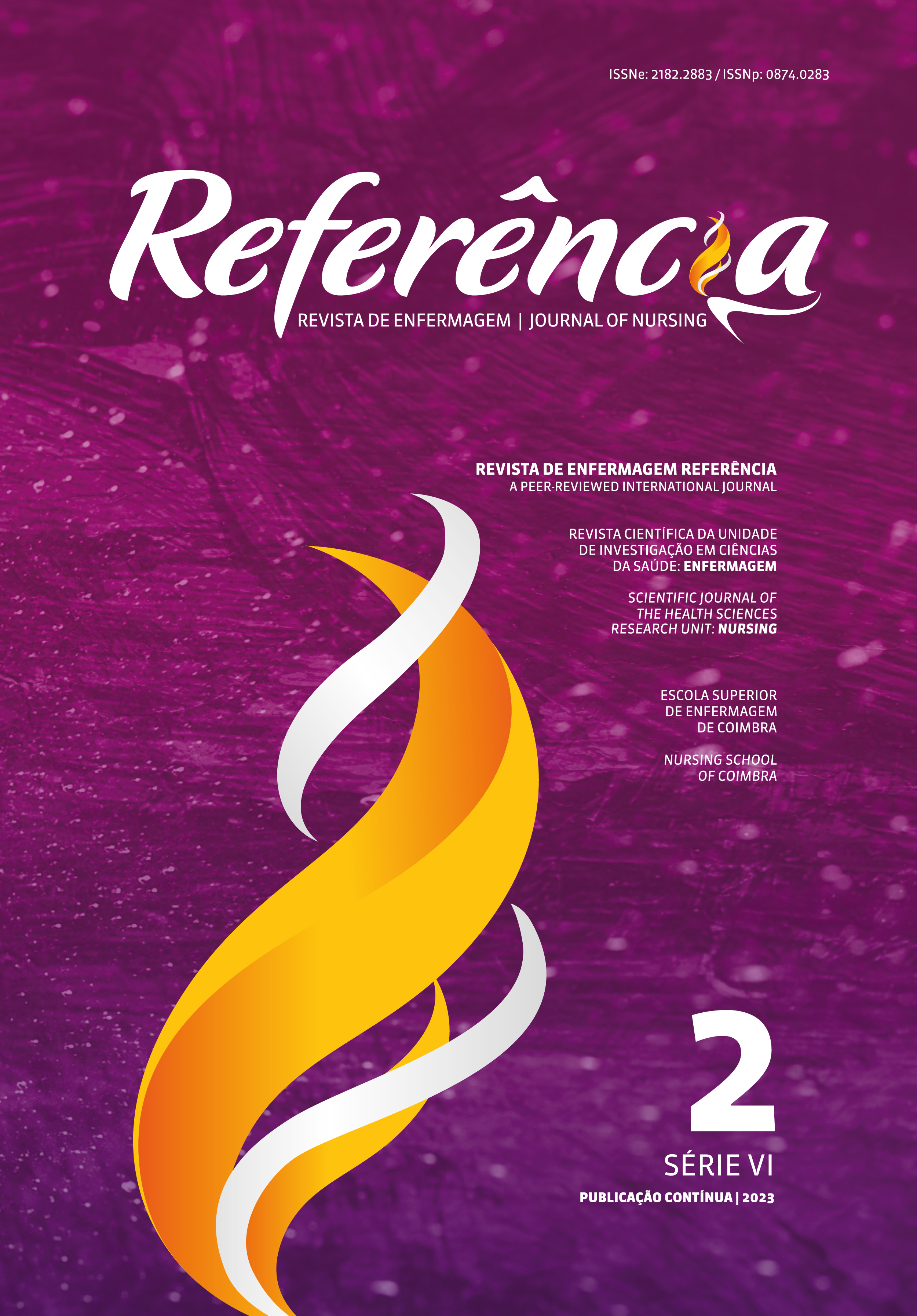Validation of the Nurse-Parent Support Tool scale for Portuguese culture: Reliability and validity
DOI:
https://doi.org/10.12707/RVI23.25.29703Keywords:
child, hospitalized, parents, support, validation study, pediatric nursing, nursing careAbstract
Background: Assessing the perceptions of parents of hospitalized children about the support provided by nurses can contribute to assessing the quality of pediatric nursing care.
Objective: To complete the cultural adaptation and validation of the Nurse-Parent Support Tool (NPST) for the Portuguese population by assessing its reliability and validity.
Methodology: Quantitative methodological study, with a sample of 291 parents of hospitalized children. The psychometric properties of the instrument were measured by assessing its reliability using Cronbach’s alpha coefficient and its construct validity through exploratory factor analysis with Varimax rotation.
Results: The psychometric characteristics of the NPST show that it is appropriate to the Portuguese population of parents of hospitalized children (Cronbach’s alpha of 0.925), as well as a reliable and valid tool to measure the support provided by nurses to these parents.
Conclusion: The European Portuguese version of the NPST - Escala de Apoio dos Enfermeiros aos Pais (EAEP) - is a reliable and valid instrument with very good internal consistency to assess the support provided by nurses to parents during a child’s hospitalization.
Downloads
References
Aftyka, A., Rozalska-Walaszek, I., Wróbel, A., Bednarek, A., Dabek, K., & Zarzycka, D. (2017). Support provided by nurses to parents of hospitalized children—Cultural adaptation and validation of Nurse Parent Support Tool and initial research results. Scandinavian Journal of Caring Sciences, 31(4), 1012–1021. https://doi.org/10.1111/scs.12426
Akbulut, H., & Uysal, G. (2022). Determination of the Relationship Between Disease Managements and the Perception of Nursing Support of Parents Whose Children are Monitored in an Intensive Care Unit. The Journal of Pediatric Research, 9(3), 214–222.
https://doi.org/10.4274/jpr.galenos.2022.48379
Casey, A. (2006). Assessing and planning care in partnership. In A Textbook of Children’s and Young People’s Nursing. Churchill Livingstone: Elsevier. Cap.7, 89-103.
Grove, S. K.; & Gray, J. R. (2022). Understanding nursing research: Building An Evidence-Based Practice. Elsevier - Health Science.
Hill, M., & Hill, A. (2000) - Investigação por questionário. 1ª ed. Lisboa: Edições Silabo, Lda.
Loureiro, F. M., Araújo, B., & Charepe, Z. B. (2021). Validação da Escala de Satisfação do Cidadão com Cuidados de Enfermagem para pais de crianças hospitalizadas. Revista de Enfermagem Referência, 5(5), e20062. https://doi.org/10.12707/RV20062
Mariano, K., Silang, J. P. B., Cui-Ramos, R., Galang-Gatbonton, G. R., Roxas-Ridulme, Q., Gatbonton, R. R., & Peralta, A. (2022). Estresse materno e percepção de apoio do enfermeiro em mãesde prematuros na unidade de terapia intensiva neonatal de um hospital terciário no Catar. Jornal de Enfermagem Neonatal, 28(2), 98–102. https://doi.org/10.1016/j.jnn.2021.08.002
Marôco, J, (2014) – Análise Estatística com o SPSS Statistics. 6ª ed. Pero Pinheiro. Report Number
Miles, M. S., Carlson, J., & Brunssen, S. (1999). The nurse parent support tool. Journal of pediatric nursing, 14(1), 44–50. https://doi.org/10.1016/S0882-5963(99)80059-1
Mok, E., & Leung, S. F. (2006). Nurses as providers of support for mothers of premature infants. Journal of Clinical Nursing, 15(6), 726–734. https://doi.org/10.1111/j.1365-2702.2006.01359.x
Pestana, M. H., & Gajeiro, J. N. (2020) – Análise de dados para ciências sociais – A Complementaridade do SPSS. 6ª ed. Lisboa: Sílabo.
Rabie, D., Provenzi, L., Matta, N., & Montirosso, R. (2021). Reli ability and Validity of the Arabic Version of the Parental Stressor Scale and Nurse Parental Support Tool: Opening Up Research on Parental Needs in Neonatal Intensive Care Units in Egypt. Advances in Neonatal Care, 21(4). https://journals.lww.com/advancesinneonatalcare/Fulltext/2021/08000/Reliability_and_Validity_of_the_Arabic_Version_of.18.aspx
Rossetto, E. G., Martins, T. B., & Mejias, N. A. (2011). Adaptação Transcultural E Validação Do Instrumento Nurse Parent Support Tool Para a Língua Portuguesa. Online Brazilian Journal of Nursing, 10(2), 1–10. https://doi.org/10.5935/1676-4285.20113305
Sanjari, M., Shirazi, F., Heidari, S., Salemi, S., Rahmani, M., & Shoghi, M. (2009). Nursing Support for Parents of Hospitalized Children. Issues in Comprehensive Pediatric Nursing, 32(3), 120–130. https://doi.org/10.1080/01460860903030193
Shevell, M., Oskoui, M., Wood, E., Kirton, A., Van Rensburg, E., Buckley, D., Ng, P., & Majnemer, A. (2019). Family-centred health care for children with cerebral palsy. Developmental Medicine Child Neurology, 61(1), 62–68. https://doi.org/10.1111/dmcn.14053
Tran C, Medhurst A, & O’Connell B. (2009). Support needs of parents of sick and/or preterm infants admitted to a neonatal unit. Neonatal, Paediatric Child Health Nursing, 12(2), 12–17.
Tosca, C. F., Rimolo, M. L., & Breigeiron, M. K. (2020). Support offered to newborns’ parents by the nursing team. Revista Brasileirade Saude Materno Infantil, 20(1), 47–54. https://doi.org/10.1590/1806-93042020000100004
Valadão, S. M. A. (2012). Contributo para a adaptação intercultural da escala “Nurse Parent Support Tool” para a realidade portuguesa. [Dissertação de Mestrado em Enfermagem de Saúde Infantil e Pediatria]. Porto: Escola Superior de Enfermagem do Porto.
YiGiT, R., AkdeniZ Uysal, D., Alici, D., BiNay, S., & Esenay, F. I. (2017). Turkish Adaptation of the Nurse Parent Support Tool. International Refereed Journal of Nursing Researches, 0(9), 1–16. https://doi.org/10.17371/UHD2017.1.0004

















